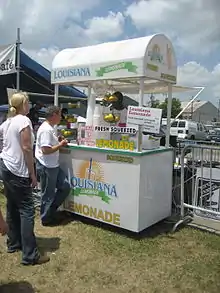Lemonade stand
A lemonade stand is a business that is commonly owned and operated by a child or children, to sell lemonade. The concept has become iconic of youthful summertime Americana[1] to the degree that parodies and variations on the concept exist across media. The term may also be used to refer to stands that sell similar beverages like iced tea.[2] In the United States, unlicensed lemonade stands have gotten in trouble with rules about permits.


The stand may be a folding table, while the archetypical version is custom-made out of plywood or cardboard boxes.[3][4] A paper sign on front advertises the lemonade stand.
Educational benefits
Lemonade stands are often viewed as a way for children to experience business at a young age. The ideas of profit, economic freedom, and teamwork are often attributed to traits lemonade stands can instill.[3] However, unlike a real business, they benefit from free labor and rent, and may have a lack of expenses.[3]
Legality
In some areas, lemonade stands are usually in technical violation of several laws, including operation without a business license or permit, lack of adherence to health codes, and sometimes child labor laws.[5]
Prosecutions of lemonade stand operations are extremely rare, but have been known to occur, typically to public outcry.[1] As an example, a child's lemonade stand was shut down in the town of Overton, Texas in June 2015. When the mother tried to get a permit, she was told she would be required to have her kitchen inspected.[6]
In 2018, Country Time created Legal-Ade, which pays up to $300 of the legal fees for lemonade stands fined in 2017 or 2018, or for 2018 permits.[7]
The New York Legislature took up a bill in 2019 that, if passed, will explicitly make lemonade stands operated by minors legal and exempt from most regulations.[8] As of that summer, fourteen U.S. states explicitly allow operation of a lemonade stand without a permit.[9]
See also
References
- Hayes, Kevin. "Lemonade Stand Shut Down by Food Inspectors; County Chair Apologizes". CBS News. Retrieved 7 April 2012.
- Cox, Doug. "Lemonade stand economics". Pryor Daily Times. Retrieved 7 April 2012.
- Aileron. "Are Lemonade Stands Good Training For Entrepreneurs?". Forbes. Retrieved 2017-04-20.
- Capotosto, Rosario; Wicks, Harry (August 1979). "Build the best lemonade stand on your block". Popular Mechanics. 152 (2): 86, 87, 129–131.
- Police in Ga. shut down girls' lemonade stand. Associated Press. Retrieved 2011-07-16.
- "Police Shut Down Girls' Lemonade Stand for Ridiculous Reason". yahoo.com.
- Campisi, Jessica; Ahmed, Saeed (2018-06-11). "For kids getting busted for running lemonade stands without permits, these guys are here to help". CNN. Retrieved 2018-07-05.
- https://www.wivb.com/news/state/dispute-over-kid-s-lemonade-stand-prompts-legislation-in-ny/1975908435?
- https://www.wivb.com/news/national/country-time-wants-to-legalize-all-lemonade-stands/2086473065